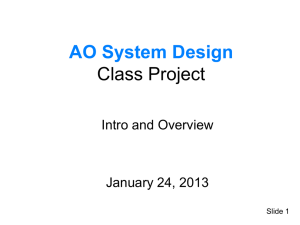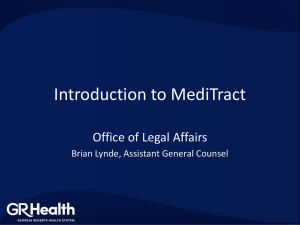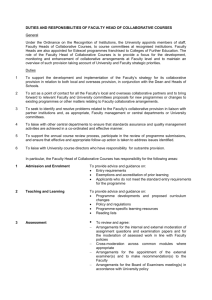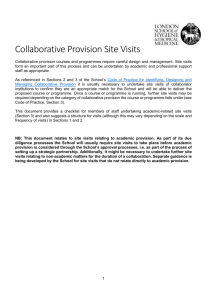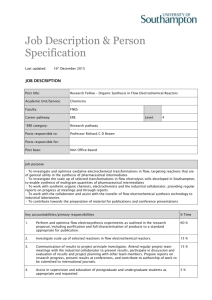Template for Collaborative Provision Course or Programme
advertisement
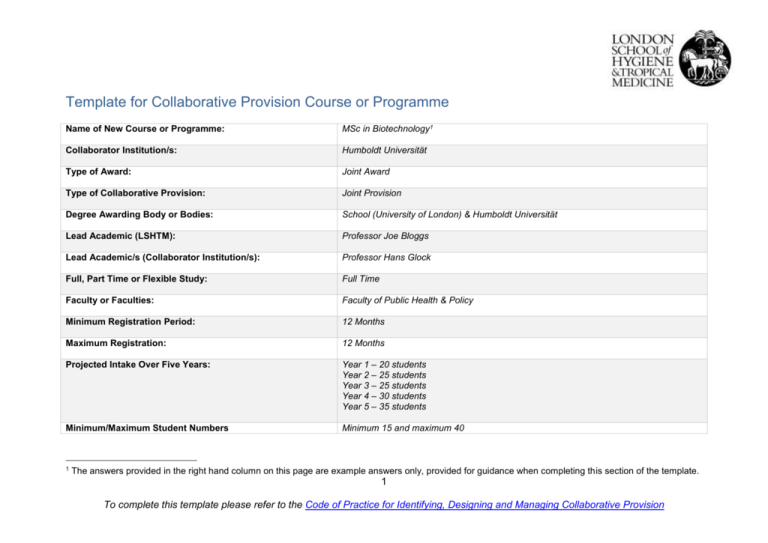
Template for Collaborative Provision Course or Programme Name of New Course or Programme: MSc in Biotechnology1 Collaborator Institution/s: Humboldt Universität Type of Award: Joint Award Type of Collaborative Provision: Joint Provision Degree Awarding Body or Bodies: School (University of London) & Humboldt Universität Lead Academic (LSHTM): Professor Joe Bloggs Lead Academic/s (Collaborator Institution/s): Professor Hans Glock Full, Part Time or Flexible Study: Full Time Faculty or Faculties: Faculty of Public Health & Policy Minimum Registration Period: 12 Months Maximum Registration: 12 Months Projected Intake Over Five Years: Year 1 – 20 students Year 2 – 25 students Year 3 – 25 students Year 4 – 30 students Year 5 – 35 students Minimum/Maximum Student Numbers Minimum 15 and maximum 40 1 The answers provided in the right hand column on this page are example answers only, provided for guidance when completing this section of the template. 1 To complete this template please refer to the Code of Practice for Identifying, Designing and Managing Collaborative Provision Contents Template for Collaborative Provision Course or Programme ........................................................ 1 Rationale for Introduction of Course/Programme........................................................................ 3 Competitor Programmes ................................................................................................................. 3 School Context ................................................................................................................................. 3 Collaboration Management Group ................................................................................................ 3 Regulations & Governance ............................................................................................................. 3 Application Procedure & Admissions ............................................................................................ 4 Registration ....................................................................................................................................... 4 Orientation ......................................................................................................................................... 4 Pastoral Support ............................................................................................................................... 4 Monitoring Student Progression..................................................................................................... 4 Examination Boards or Examiners’ Meetings .............................................................................. 4 Arrangements for Award of Degree............................................................................................... 4 Graduation ......................................................................................................................................... 4 Collaboration Management Groups Constitution & Terms of Reference ................................ 5 Constitution ................................................................................................................................... 5 Terms of Reference ..................................................................................................................... 5 2 To complete this template please refer to the Code of Practice for Identifying, Designing and Managing Collaborative Provision Rationale for Introduction of Course/Programme This section should present a detailed rationale for the introduction of the proposed academic provision. This section must discuss: collaborator/s’ reputation and history; collaborator/s’ level of expertise in the proposed subject area; reasons why the collaborator/s is the most suitable institution/s with whom to team up with to deliver the course/programme; collaborator/s’ experience of running courses/programmes of this type; collaborator/s’ experience of delivering collaborative provision course/programmes; benefits to the School and to students in delivering the course/programme with the collaborator. Competitor Programmes This section should provide information on competitor courses/programmes and details on how the School and collaborator will differentiate themselves from existing courses/programmes. School Context This section should discuss how the proposed course/programme will fit with the School’s vision, mission, strategy and values and outline discussions that have taken place with colleagues in the School who may be involved with the course/programme. These discussions may be with Module Organisers of existing modules that the Academic Lead may wish to include in the programme, or with a course team where there is some overlap of content and potential concerns regarding internal competition. Collaboration Management Group Most collaborative provision courses and programmes are required to establish a Collaboration Management Group (see Section 3.1 of the School’s Code on Identifying, Designing & Managing Collaborative Provision). Use this section to detail the constitution of the group, the frequency of meetings and the pattern of matters that you plan to discuss at scheduled meetings (i.e. July = sign off student handbooks, November = planning for management of February examinations). General constitution and terms of reference for Collaboration Management Groups are set out in Appendix A and should be adapted specifically for this course or programme. If you are proposing validated external or collaborator supported provision please outline how you will manage communications with the collaborator/s. Regulations & Governance In this section the Academic Lead should confirm the regulations that students on the course/programme will be expected to follow. For example if a student makes an appeal or complaint, which institution’s procedures will be followed? In cases where a joint award is being developed, there will be the need to adapt School and collaborator regulations to produce a shared regulation for a particular component, i.e. examination of PhD students. Any newly created shared regulations or procedures must be appended to this document for approval by the validation panel on behalf of Senate. 3 To complete this template please refer to the Code of Practice for Identifying, Designing and Managing Collaborative Provision Application Procedure & Admissions The Programme Specification will include detailed information on admissions requirements. This section should state where responsibility lies for admissions arrangements and the systems that will be used to process applications. The Academic Lead is expected to liaise with the Head of Registry (Admissions & Student Finance) to agree arrangements between the School and the collaborator/s. Registration This section should outline registration arrangements, confirming which institution/s the students will register with and how this will be managed. The Academic Lead is expected to liaise with the Head of Registry (Student Records & Assessment) to agree arrangements between the School and the collaborator/s. Orientation This section should detail how students will be inducted to the School and the collaborator institution/s and any special arrangements that will need to be put in place to facilitate this. Pastoral Support This section should detail the support that students will receive whilst they are studying and, crucially, who will be responsible for providing this support. For example, if a student has, or suspects that they have, a disability, where should they seek support and guidance? Alternatively, what level of support will be available to them in finding accommodation? Monitoring Student Progression The progress of students should be monitored by the Collaboration Management Group. In this section, the Academic Lead should outline how this will work in more detail to ensure that struggling students are supported and that all students are offered appropriate advice and insight on their performance at specific stages of the course or programme. Examination Boards or Examiners’ Meetings This section should be used to confirm arrangements for examination boards (for courses) and examiners’ meetings (for research students). For example, where will these be held, who will Chair them, who is responsible for taking minutes and following up on action points, who will appoint external examiners, who will ensure that deadlines of awarding bodies are met etc? Arrangements for Award of Degree In this section the Academic Lead should set out the arrangements for the award of the degree. For example, who is responsible for producing certificates and transcripts, what will certificates for dual and joint awards look like, who will be responsible for sending out certificates and transcripts etc? The Academic Lead is expected to liaise with the Head of Registry (Student Records & Assessment) to agree arrangements between the School and the collaborator/s. Graduation This section should set out arrangements for graduation. For example, where will students attend graduation, who is responsible for communicating arrangements with them, are they allowed to pick where they graduate for joint awards etc? 4 To complete this template please refer to the Code of Practice for Identifying, Designing and Managing Collaborative Provision Appendix A Collaboration Management Groups Constitution & Terms of Reference These example terms of reference are provided for adaptation for both new and existing collaborative courses/programmes. If an existing collaborative provision course/programme already has a similar group in place the name does not need to be changed to Collaboration Management Group however the group will need to ensure it is in line with the expected constitution and terms of reference and to produce an annual report if required (see Section 3 of the Code of Practice on Identifying, Designing and Managing Collaborative Provision for more information on reporting requirements). Constitution Minimum Membership (Small scale initiatives – see Code of Practice, Section 3, for guidance) Chair Academic Lead of lead institution. If there is no lead institution (i.e. for a joint award) then the School and collaborator/s will decide who is best placed to act as Chair. Members Academic Leads from each institution taking part in the collaboration. Secretary Professional Services staff involved with the course or programme. Additional Membership (Medium/large scale initiatives – see Code of Practice, Section 3, for guidance) Members Academic members of staff involved in delivering and managing the course/programme The quorum for the Collaborative Management Groups is 75% attendance. Terms of Reference The role of the Collaboration Management Group is to have an oversight of all aspects of the course/programme with a special emphasis on identifying potential risks and establishing mechanisms to manage the course/programme, including but not limited to: A. Making all decisions relating to the entry of students to the programme, from all institutions, with input from the Officers within each institution normally tasked with making admissions offers; B. Reviewing recruitment to the programme in the light of anticipated targets and continuously reviewing the targets themselves to decide whether they are appropriate; 5 To complete this template please refer to the Code of Practice for Identifying, Designing and Managing Collaborative Provision C. Having input into requests for suspensions of regulations, interruptions of study and extensions to submissions deadlines, before approval is granted by the relevant institution; D. Acting as a conduit between the collaborator institutions to ensure that information on disabled student requirements, such as reasonable adjustments for example, are put in place for the student’s arrival or adjusted if necessary (the student’s permission to share information must be sought by the home or lead institution/s prior to any disclosure of information); E. Reviewing orientation arrangements for students at all sites, identifying any areas for improvement and working with the collaborator institutions to develop orientation activities generally; F. Reviewing the effectiveness of pastoral and welfare support systems and identifying developments required to ensure that students are supported appropriately at all institutions; G. Reviewing the effectiveness of administrative arrangements for the course or programme, such as registration, IT and Library provision, certificate production, upgrade and examination arrangements etc, devising and driving enhancements where required; H. Regularly reviewing the academic progress of all students registered on the programme, taking account of the different timings of formal and informal progression review monitoring activities at both institutions. The Collaboration Management Group will need to agree an approach to take in cases where it appears that a student is underperforming; I. Establishing mechanisms for obtaining feedback from students outwith the methods already employed by both institutions, i.e. participation in national surveys. This includes agreeing how to act on feedback and ensuring that responses are made available to current and future cohorts; J. Proactively participating in any complaints and appeals cases made at any collaborator institution, providing information and input in a timely fashion in order to meet deadlines for responding to students; K. Reviewing pass, withdrawal and completion rates to determine trends and any actions required as a result; L. Reviewing the financial viability of the programme, making recommendations to all institutions on an annual basis regarding the continuation of the programme. 6 To complete this template please refer to the Code of Practice for Identifying, Designing and Managing Collaborative Provision

